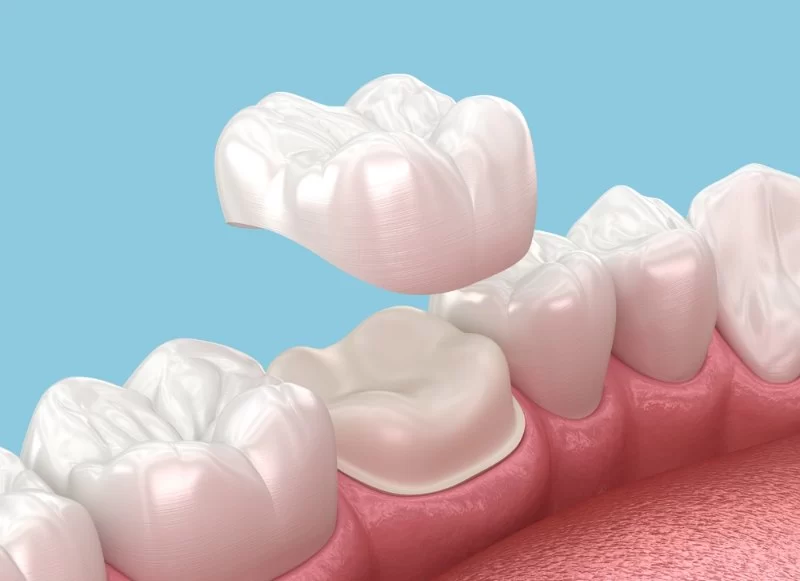
How to Care for Dental Crowns After Placement
Getting a dental crown is a common dental procedure that helps restore damaged teeth and improve their functionality and appearance. While dental crowns are durable and long-lasting, taking care of them properly after placement is crucial for ensuring their longevity and maintaining your oral health. In this guide, we’ll walk you through the steps and tips on how to care for your dental crowns after placement, so you can enjoy a healthy, confident smile for years to come.
1. Understanding the Importance of Dental Crown Care
Dental crowns are designed to be a long-term solution for damaged or decayed teeth. They are usually made of materials such as porcelain, metal, or a combination of both, offering both strength and aesthetic appeal. However, just like natural teeth, crowns can be affected by wear and tear, food habits, and oral hygiene. Proper care after placement not only ensures your crown remains intact but also prevents further dental issues such as tooth decay or gum disease.
2. Post-Placement Care Immediately After the Procedure
After your dental crown has been placed, there are a few immediate steps you should follow to ensure a smooth recovery and avoid any potential complications.
1. Avoid Hard and Sticky Foods
For the first few days after the placement of your crown, it’s important to avoid hard or sticky foods that may put excess pressure on the newly placed crown. Foods like nuts, chewing gum, caramel, or hard candies can damage or dislodge the crown. Stick to softer foods that won’t risk harming the crown or causing discomfort to your teeth.
2. Don’t Chew on the Side of the Crown
After your crown is placed, you may experience some tenderness in the area where the crown was applied. To avoid putting pressure on that area, it’s advisable to avoid chewing directly on that side of your mouth for a few days. If you’ve received a crown on a back tooth, consider chewing on the opposite side for a week or two to allow the crown to settle in properly.
3. Maintain Excellent Oral Hygiene
Maintaining good oral hygiene is essential for the health of both your natural teeth and your dental crown. Proper cleaning helps prevent plaque buildup, gum disease, and tooth decay, which could compromise the crown over time.
1. Brush and Floss Regularly
Brush your teeth at least twice a day, and be sure to use a soft-bristled toothbrush. This helps clean the crown and prevent plaque from building up. When flossing, make sure to use a gentle technique to avoid dislodging the crown. Some people find it helpful to use a floss threader to slide the floss under the crown without damaging it.
2. Use Non-Abrasive Toothpaste
While you might be tempted to use a whitening toothpaste, it’s better to opt for a non-abrasive toothpaste that won’t scratch the surface of your dental crown. Abrasive toothpastes can create microscopic scratches on the surface of porcelain crowns, making them more prone to staining and dullness over time.
4. Regular Dental Checkups
Even though your dental crown is designed to be long-lasting, it’s still important to visit your dentist for regular checkups and cleanings. Your dentist will be able to check the condition of your crown, make sure it’s still securely in place, and monitor the health of the surrounding teeth and gums. Routine checkups also allow for early detection of any potential issues such as gum recession or tooth decay under the crown.
5. Managing Sensitivity and Discomfort
After getting a crown, it’s not uncommon to experience some sensitivity, especially to hot or cold foods and drinks. This sensitivity usually diminishes over time. However, if the discomfort persists, it's important to consult your dentist. They can check if the crown is properly fitted and make any necessary adjustments.
1. Use Desensitizing Toothpaste
If you’re experiencing sensitivity after crown placement, using a desensitizing toothpaste can help alleviate the discomfort. These toothpastes are formulated to block the transmission of pain signals from the surface of your teeth to the nerve, providing relief.
2. Avoid Extreme Temperature Foods
Until the sensitivity subsides, try to avoid consuming foods and drinks that are too hot or cold. Eating foods at moderate temperatures will help reduce discomfort and protect your crown from any additional stress.
6. Be Mindful of Teeth Grinding
If you have a habit of grinding your teeth (bruxism), it’s important to address this concern, especially if you’ve recently had a dental crown placed. Grinding can wear down the crown or cause it to become loose. Your dentist may recommend using a night guard to protect your crown while you sleep. A custom-made night guard can help reduce the risk of damaging your crown due to grinding or clenching.
7. What to Do If Your Crown Comes Loose
In rare cases, a dental crown may become loose or fall off. If this happens, don’t panic. It’s essential to visit your dentist as soon as possible to have the crown re-cemented or replaced. In the meantime, try to avoid chewing on the affected side and save the crown if it comes off completely, so your dentist can assess the situation and reattach it.
8. How to Handle Cracks or Chips in the Crown
While dental crowns are durable, they can still crack or chip under certain conditions. If you notice any cracks or chips, it’s important to see your dentist immediately. A cracked crown can expose the underlying tooth, which could lead to decay or infection. Your dentist may recommend replacing the crown to avoid further complications.
9. Conclusion: Taking Care of Your Dental Crown
Proper care of your dental crown is crucial to ensure its longevity and maintain your overall oral health. By following these tips — avoiding hard foods, maintaining good oral hygiene, and visiting your dentist regularly — you can enjoy the benefits of a durable, aesthetically pleasing crown for many years. If you have any concerns about your dental crown or need additional advice on maintaining it, don’t hesitate to reach out to your dentist for personalized guidance.
If you're looking for expert dental care or need assistance with your dental crowns, visit [Family Dentistry Online](https://www.familydentistryonline.com) for the best services and products to support your oral health.







 Charleston Smiles Dentistry4.0 (194 review)
Charleston Smiles Dentistry4.0 (194 review) Steve Kim DDS Dental Group4.0 (213 review)
Steve Kim DDS Dental Group4.0 (213 review) Sun City Dental Center4.0 (562 review)
Sun City Dental Center4.0 (562 review) Barrington Grove Dental4.0 (263 review)
Barrington Grove Dental4.0 (263 review) Dr. Ajit K. Sardana, Orthodontist5.0 (2 review)
Dr. Ajit K. Sardana, Orthodontist5.0 (2 review) Brian Kerr DMD, PS4.0 (827 review)
Brian Kerr DMD, PS4.0 (827 review) The Importance of Oral Health Education During Pregnancy for a Healthy Pregnancy
The Importance of Oral Health Education During Pregnancy for a Healthy Pregnancy Best Tips for Brushing Your Teeth Properly for Healthy Gums: Essential Techniques for Oral Health
Best Tips for Brushing Your Teeth Properly for Healthy Gums: Essential Techniques for Oral Health Why Skipping Dental Checkups Can Lead to Bigger Oral Health Problems
Why Skipping Dental Checkups Can Lead to Bigger Oral Health Problems Advantages of Porcelain Dental Restorations
Advantages of Porcelain Dental Restorations How Can Diabetes Cause Tooth and Gum Problems? Preventing and Managing Oral Health Issues
How Can Diabetes Cause Tooth and Gum Problems? Preventing and Managing Oral Health Issues Healthy Habits for Promoting Good Oral Health and Hygiene: Tips for a Healthy Smile
Healthy Habits for Promoting Good Oral Health and Hygiene: Tips for a Healthy Smile